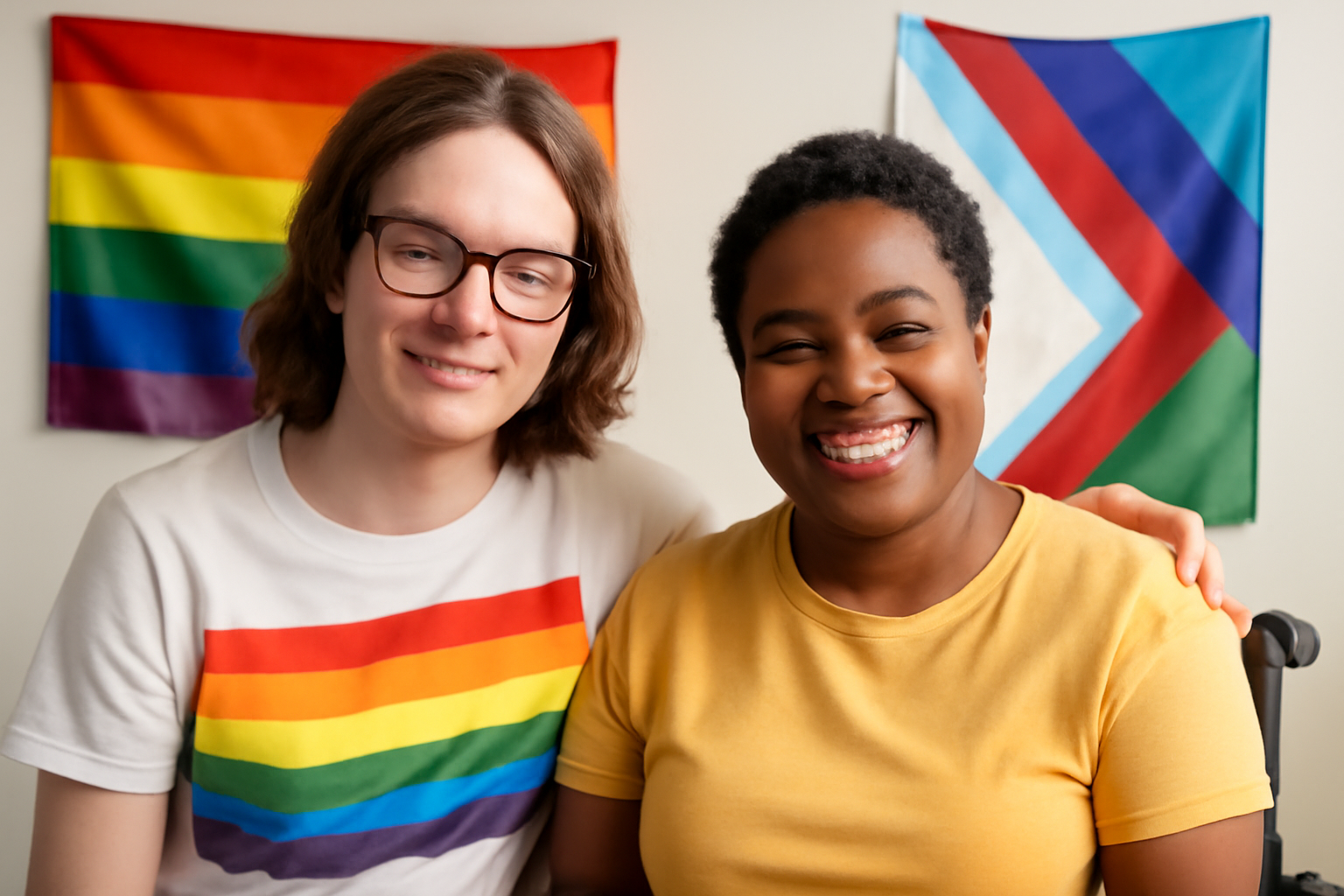
Exploring LGBTQ+ and Disability Pride: Celebrating Identity and Advocacy
Thinking back on my teenage years, I realize how little I understood LGBTQ+ and Disability Pride. Growing up, I was surrounded by people who condemned LGBTQ+ folks and treated disabilities like secrets. If you'd told me then that I'd become an openly autistic transgender advocate, traveling from Ukraine and Russia all over Europe and even down under in Australia, I'd have been shocked. But here I am, honored and eager in my work with various LGBTQ+ and disability rights organizations worldwide. Still, I can't shake off some memories. Like that time a comedian I loved made an awful joke, calling gay people "sick folks with hormonal problems." It was hurtful and made me question what there even was in Pride. Back then, I didn't feel able or ready, I guess, but seeing disabled kids get bullied? That stirred something in me—a fierce urge not just fight back but actually celebrate their grit and survival.What Pride Truly Means: Being Your Real Self
For me, Pride isn't just about accepting who you are—it's about really embracing it, celebrating your true self even when things get tough. This idea runs deep in both LGBTQ+ and Disability Pride. Both are about resilience, empowerment, and just living your truth, no matter what life throws your direction. July marks Disability Pride Month, a time rooted back in 1990 when Congress passed The Americans with Disabilities Act in America. Inspired by LGBTQ+ Pride, Disability Pride even has its own flag developed by Ann Magill in 2019. You'll see it proudly flying at different events, even online, alongside LGBTQ+ flags on platforms like Finch, a self-care app. Disability Pride has spread beyond U.S. borders, catching on in places like U.K. since 2015. My first brush with Disability Pride was at a queer community event in Russia.Moments That Matter: From Stonewall's Streets To The Capitol Crawl
One turning point in disability history, often likened Stonewall, was Capitol Crawl. In 1990, there was an unforgettable moment when over a thousand disabled folks converged on Capitol Hill. About 60 activists, including a brave young girl named Jennifer Keelan-Chaffins, left their mobility aids behind and crawled up those imposing steps. Their defiant act shed light on everyday barriers they faced and pushed through The ADA, marking disability rights history. Around globe, disability and LGBTQ+ rights activists find strength from each other. Unique pride events like Autistic Pride Day on June 18 are rising. I first took part in organizing these in Russia, thanks in no small part some amazing American activists and local LGBTQ+ groups who helped us out.Overcoming Obstacles: Crafting Truly Inclusive Pride Events
You'd think there's a natural alliance here, right? But big LGBTQ+ groups often miss fully inclusive mark. From Ukraine and Russia, Israel and Europe, and over in U.K., Australia, and America, I've seen that disability-inclusive Pride events are hard find. LGBTQ+ Pride culture typically centers around abled, neurotypical individuals, ignoring that about 16% in LGBTQ+ circles live with disabilities. This number may be even lower than reality considering autism and mental health issues prevalent in our community. Making inclusive Pride events isn't just possible; it's essential. It takes deliberate steps: - Check routes and venues—make them wheelchair friendly. - Support animals? Absolutely. - Quiet spaces soothe sensory overload. - Avoid flashing lights that trigger epilepsy. - Share clear, simple details about events. - Use image descriptions and communication badges. Most importantly, listen. “Nothing about us without us” resonates deeply. Disabled LGBTQ+ activists must be involved at every stage—planning, outreach, leadership. They're not tokens—they're vital voices and contributors.Creating a New Global Benchmark in Inclusion
The American LGBTQ+ movement wields significant global influence; imagine spotlighting accessibility at U.S. Pride events, setting a transformative worldwide standard. It sends a powerful message, especially now when political forces threaten LGBTQ+ and disability rights. Accessible and inclusive Pride marches aren't just nice-to-haves—they're necessities. By coming together in our shared history, tearing down barriers, and standing against bigotry, we ensure no one's left out in cold.Related Posts
Leanne Quigley Shares Exciting Plans for Wedding and Family with Partner Sophie
Leanne Quigley, who stole our hearts and took home victory in season three's The Traitors, has some amazing news! She's readying herself—and her loved one, Sophie Jones—for some big life changes that include wedding bells and possibly a bigger family. In a recent chat, Leanne divulged that she's planning on using a slice, or maybe a chunk, a pretty big chunk actually, from her £94,600 prize w [...]
Maryland Governor Wes Moore Champions LGBTQ+ Rights at Pride Reception
### Maryland Governor Wes Moore Hosts a Heartfelt Pride Celebration Maryland's Governor Wes Moore recently threw a lively Pride Month reception at Government House in Annapolis, showcasing his unwavering support and commitment towards LGBTQIA+ rights. This event was more than just a gathering; it was a coming together—a vibrant celebration that drew together key players and organizations dedica [...]
Political Campaign Group Projects Bold Video on Tesla Factory: A Critique of Elon Musk's Alleged Far-Right Alliances
In a surprising twist, Berlin's Tesla gigafactory became an unexpected stage last week. This time, it wasn't about electric cars or innovation, but a bold political protest. The British group Led By Donkeys joined forces with Germany's Centre For Political Beauty, transforming Tesla's massive exterior walls with a five-minute video critiquing Elon Musk. Projected onto this expansive backdrop, the [...]